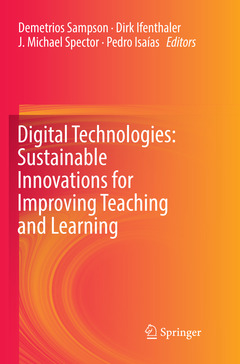Description
Digital Technologies: Sustainable Innovations for Improving Teaching and Learning, Softcover reprint of the original 1st ed. 2018
Coordinators: Sampson Demetrios, Ifenthaler Dirk, Spector J. Michael, Isaías Pedro
Language: English
Subject for Digital Technologies: Sustainable Innovations for...:
Keywords
Educational technology; Educational data analytics; 21st century competencies; Blended learning; Learning environments; Instructional design and technology; Technology integration in learning and instruction; Teacher preparation; Educational administration; School leadership models; Competence frameworks; Flipped classrooms; Adaptive game based learning; Collaborative problem solving; learning and instruction
Publication date: 01-2019
Support: Print on demand
Publication date: 03-2018
Support: Print on demand
Description
/li>Contents
/li>Biography
/li>Comment
/li>
The aim of this volume entitled Digital Technologies: Sustainable Innovations for improving Teaching and Learning is to contribute in the global discussion on digital technologies as the means to foster sustainable educational innovations for improving the teaching, learning and assessment from K-12 to Higher Education. It compiles papers presented at the CELDA (Cognition and Exploratory Learning in the Digital Age) conference, which has as its goal continuing to address these challenges and promote the effective use of new tools and technologies to support teaching, learning and assessment. The book consists of four parts and showcases how emerging educational technologies and innovative practices have been used to address core global educational challenges; spanning from rethinking and transforming learning environments across educational contexts to effectively cultivating students? competences for the digital smart society of the future. The book comprises Part I: Transforming the Learning Environment; Part II: Enriching student learning experiences; Part III: Measuring and Assessing Teaching and Learning with Educational Data Analytics; Part IV: Cultivating student competences for the digital Smart society. It targets researchers and research students, educational professional practitioners (including teachers, educators and education leaders) as well as education policy makers, who are interested in keeping up-to-date on the global development in this field.
Demetrios Sampson is a Professor of Digital Systems for Learning and Education at the Department of Digital Systems, University of Piraeus, Greece, where he serves as Academic Staff since 2001, and a Professor of Learning Technologies at the School of Education, Curtin University, Australia since 2015. He is the co-author of 365 articles in scientific books, journals and conferences, and the editor of 12 books, 32 special issues and 35 international conference proceedings. He has received 10 times Best Paper Award in International Conferences (with at least 4500 citations in Google Scholar, November 2017). He has been a Keynote/Invited Speaker/Lecturer in 75 International/National Conferences and/or Postgraduate Programs around the world. He has been project director, principle investigator and/or research consultant in 70 Research and Innovation projects with external funding at the range of 16 Million€. He has supervised 155 honors and postgraduate students to successful completion. He has developed and delivers the first MOOC on the use of Educational Data Analytics by School Teachers (Analytics for the Classroom Teacher), offered by the edX platform which has attracted more than 7000 participants from 145 countries around the world since October 2016. He served as Editor-in-Chief of one of the first open access journals in educational technology, the Educational Technology & Society Journal, 2003-2018. He has also served or serves as Member of the Steering Committee and/or Advisory and/or Editorial Board of 25 International/National Journals, in various leadership roles in 75 International Conferences and at the Program Committee of 500 International/National Conferences. He is the recipient of the IEEE Computer Society Distinguished Service Award (July 2012) and named a Golden Core Member of IEEE Computer Society in recognition of his contribution to the field of Learning Technologies (January 2013).
Dirk Ifenthaler is Profes
Represents the very latest work in the area where information and communications technology, educational psychology and instructional design intersect
Emphasizes the implications for teaching, learning and assessment from K-12 to Higher Education as well as educational innovation planning
Represents a genuinely multi-disciplinary approach to the field
Contributes to a library of proceedings kept by many libraries and scholars in the field
Appeals to all speakers, presenters, and participants of the CELDA 2015 and CELDA 2016 conferences




